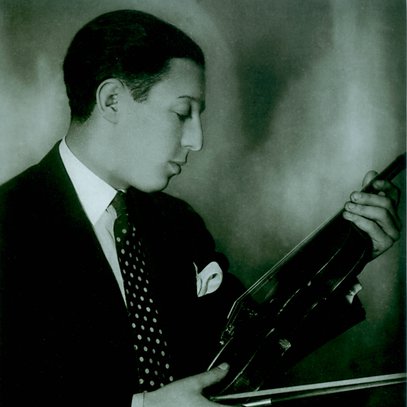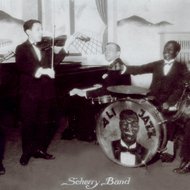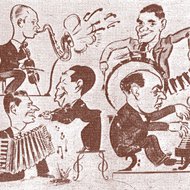Daniel Pomerantz
The violinist Daniel Pomerantz’s (1904–1981) jazz-band was the best exponent of swinging orchestra in the interwar Lithuanian little stage. The band usually performed in Konradas café in Kaunas. Pomerantz studied violin with Itzhak Vildman-Zaidman at the Kaunas Juozas Naujalis School of Music and Willy Hess at the Berlin Conservatoire. In Vienna he attended master classes given by Bronisław Huberman, a renowned violin virtuoso. While in Berlin, Pomerantz played in cafés and Marek Weber orchestra, at the time one of the most popular orchestras in Europe. Upon returning to Kaunas around 1933, Pomerantz formed an ensemble of multiinstrumentalists. The ensemble performed in Konradas and Monika cafés and not before long started competing with the celebrated Hofmeklerband in terms of mastery. He liked to play solo violin in cafés; he played almost the entire violin repertoire fascinating his listeners by virtuoso passages and improvisations. He excelled in Spanish and Gypsy melodies. In 1936, orchestra under the baton of Pomerantz joined by recording studio orchestra members and soloist Antanas Dvarionas recorded for London’s label Columbia 11 plates of shellac featuring fashionable tangos, waltzes and foxtrots.
Rūta Skudienė
You and only you - Forwards (polka)
Legendary musicians of the little stage 1920s-1930s Kaunas, Lithuania - The Wheel is Turning
You and only you - You and only You (English waltz)
Biography
Daniel Pomerantz (1904–1981) was born in Šiauliai to a family of Jewish entrepreneur. In 1920, he was accepted to Kaunas Juozas Naujalis School of Music where he studied with Itzhak Vildman-Zaidman. Since 1922, he studied violin with Willy Hess at the Berlin Conservatoire. In Vienna he attended master classes given by Bronisław Huberman, a renowned violin virtuoso. (According to Danutė Pomerancaitė, Pomerantz’ daughter, also a violin professor, Huberman was fascinated by Daniel’s talent, would not accept payment for his lessons, and wanted to adopt him.)
While in Berlin, Pomerantz played in cafés and Marek Weber orchestra, at the time one of the most popular orchestras in Europe. Weber himself was an outstanding violinist; his orchestra recorded a number of pop music plates of shellac sought after around the world. At the time among the students of Berlin Conservatoire and members of Weber’s orchestra was Eddie Rosner, a jazz trumpeter dubbed the ‘white Luis Armstrong’. Upon returning to Kaunas around 1933, Pomerantz formed an ensemble of multiinstrumentalists. The ensemble performed in Konradas and Monika cafés and not before long started competing with the celebrated Hofmeklerband in terms of mastery.
Contemporaries remember Pomerantz as an extraordinarily agile and original musician, and resourceful manager. He liked to play solo violin in cafés; he played almost the entire violin repertoire fascinating his listeners by virtuoso passages and improvisations. He excelled in Spanish and Gypsy melodies.
In 1936, orchestra under the baton of Pomerantz joined by recording studio orchestra members and soloist Antanas Dvarionas recorded for London’s label Columbia 11 plates of shellac featuring fashionable tangos, waltzes and foxtrots. In terms of recording sound, Pomerantz’s orchestra can easily be compared to the celebrated Weber orchestra.
During the Nazi occupation Pomerantz was imprisoned in Kaunas Ghetto and Dachau concentration camp. In Kaunas Ghetto together with Moishe Hofmekler he formed 40 musicians’ orchestra, which performed large format symphonic music concerts.
After the war, having escaped the fate of many of Jewish people, he played in Kaunas Operetta, Tulpė café, later in the Lithuanian State Symphony Orchestra. He immigrated to Canada in 1974.


